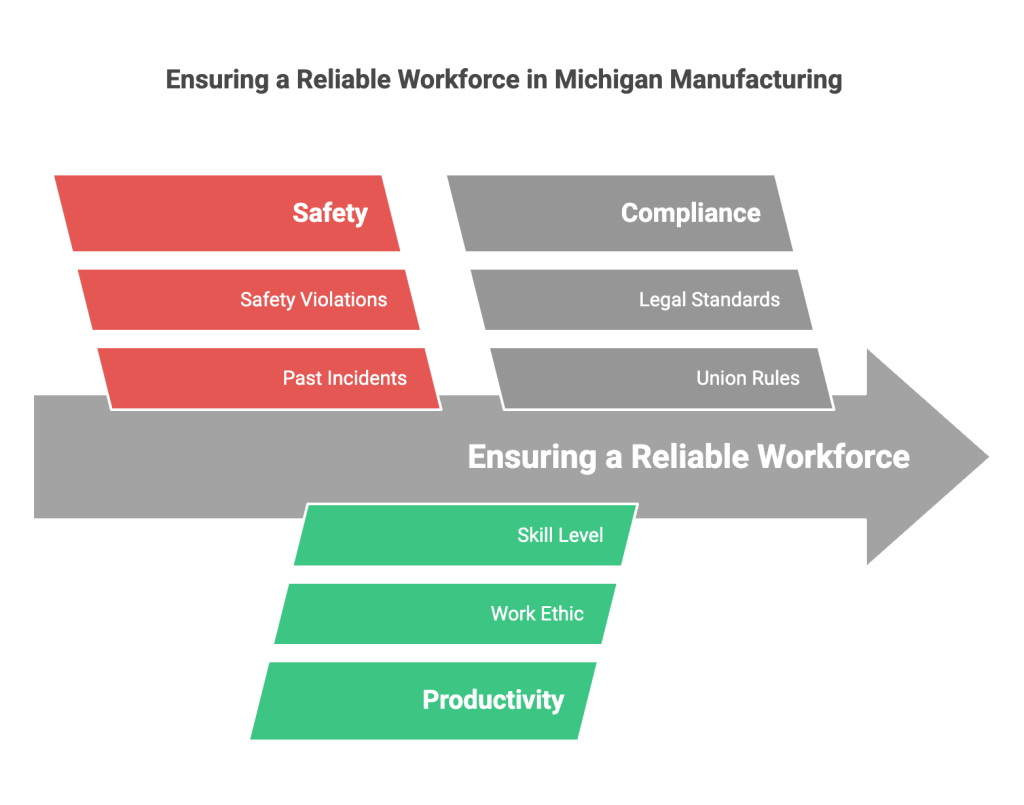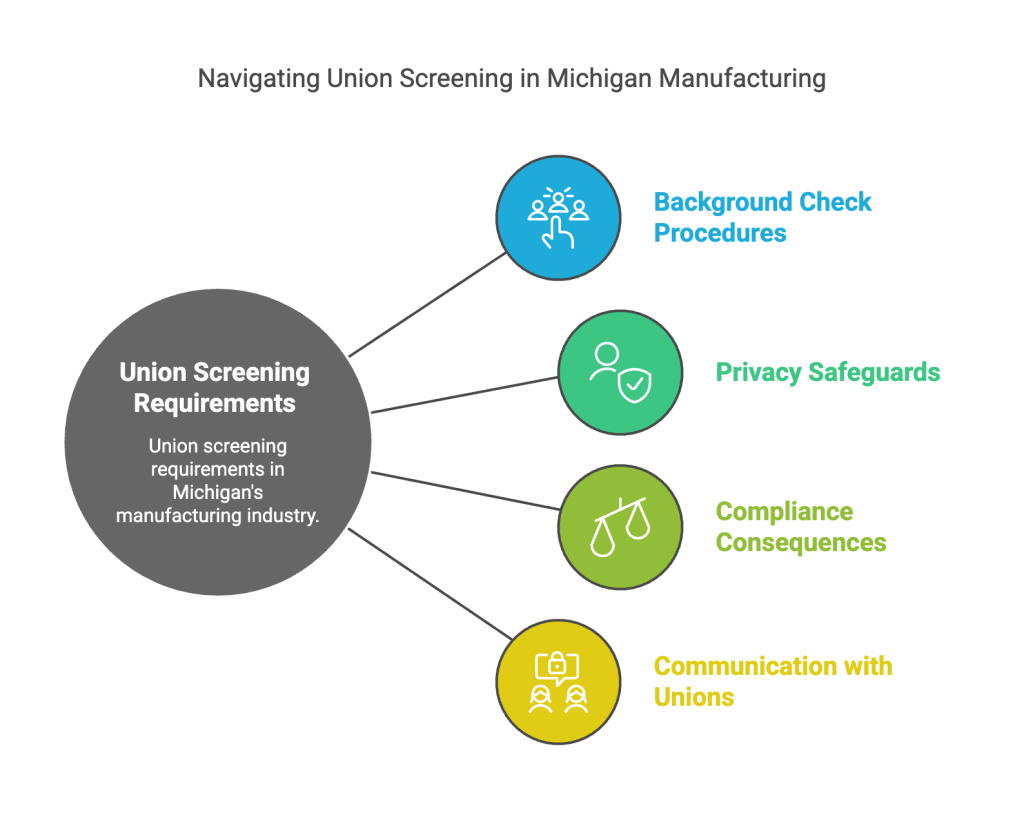In the world of manufacturing, especially within the bustling industry of Michigan, assurance in a strong, compliant workforce is paramount. Background checks play an essential role in validating the credentials and integrity of potential hires. Moreover, when intersected with union rules and MI OSHA compliance, the landscape becomes even more intricate. Whether you're an employer ensuring regulatory adherence or a candidate navigating the job-seeking process, understanding the framework of Michigan manufacturing background checks can be a game-changer.
Key Takeaways
- Background checks are crucial for safety, productivity, and compliance in Michigan's manufacturing sector.
- Key components of these checks include employment, criminal, and education verification to ensure candidate reliability.
- Union agreements add complexity, requiring adherence to specific screening processes and privacy safeguards.
- MI OSHA standards must be integrated into background checks to ensure workplace safety and legal compliance.
- Adopting consistent and fair practices in background checks aligns with EEOC guidelines and protects against legal risks.
Introduction
Background checks in Michigan's manufacturing sector are not just a formality; they are a critical component that supports the industry's integrity and compliance. Manufacturing is a cornerstone of Michigan's economy, employing a sizable portion of the workforce. This reality makes thorough background screening essential for upholding safety and productivity. Intersecting with union regulations and MI OSHA standards, these checks ensure that both legal requirements and organizational policies are followed.
In this guide, we aim to demystify the importance and execution of background checks within this sector. For employers, understanding these checks can mean the difference between compliance and costly violations. For job-seekers, awareness can prevent unexpected hurdles and align their expectations with industry standards. We will explore union rules that influence hiring and the role MI OSHA plays in setting safety precedents. Whether you oversee hiring or are a prospective employee, having a firm grasp of these elements is crucial for navigating Michigan's manufacturing landscape effectively.
The Importance of Background Checks in Michigan Manufacturing
Michigan's manufacturing sector stands as a cornerstone of the state's economy, employing thousands and generating substantial revenue. In such a vital industry, ensuring the quality and reliability of the workforce isn't just preferable; it's essential. Background checks play a crucial role here, verifying that potential employees have the credentials and history to ensure workplace safety and efficiency.

In manufacturing, safety isn't just policy; it's a necessity. A single error can lead to accidents, hefty fines, and halts in production. Background checks help mitigate these risks by screening for past incidents that might indicate unsafe behavior. For example, a candidate with a history of violations related to safety procedures may pose a higher risk.
Productivity is another critical factor. In manufacturing, productivity links directly to profit. Background checks help ensure that potential hires have the work ethic and skills necessary to contribute positively to the company's goals. When hiring, you look for individuals who will enhance your team's capabilities, not hinder them.
Compliance is the third pillar. Both union rules and MI OSHA standards can be complex, necessitating meticulous attention during hiring. Background checks can help you remain compliant with these regulations, avoiding the repercussions of non-compliance. For instance, hiring someone with a disqualifying criminal record might violate federal or state laws and union agreements, leading to potential legal battles or fines.
Investing in thorough background checks fosters a secure, proficient, and compliant workforce. Ultimately, it's about safeguarding your business, your employees, and your company's reputation. Have you assessed how well your current screening practices serve these ends?
Key Components of Michigan Manufacturing Background Checks
Background checks in Michigan's manufacturing industry are essential for maintaining a productive and safe work environment. Here are the key components that deserve your attention:
Employment Verification: This checks the accuracy of a candidate's employment history. Verifying dates, positions held, and reasons for leaving ensures you hire someone with the right experience for the job. For instance, if a resume claims extensive experience with CNC machines, verifying that employment history can prevent costly errors down the line.
Criminal Record Checks: These checks ensure the safety and integrity of the workplace. Michigan law allows you to access felony and misdemeanor convictions but restricts the use of this information if it's unrelated to the job. Always follow the guideline: relevance to the role is crucial. For example, a theft conviction may be pertinent for a position requiring handling of valuable materials.
Education Verification: Relevant in industries relying heavily on technical skills. Ensure the candidate’s claimed qualifications match records from educational institutions. This is particularly critical when hiring for roles requiring specific certifications, like welding or engineering. Confirming education credentials can prevent hiring underqualified candidates, a mistake that could lead to operational inefficiencies.
Reference Checks: Speaking to past employers or colleagues gives you insights into a candidate’s performance and work ethic. This step adds a layer of understanding beyond what's on paper. Asking pointed questions about the candidate's reliability and teamwork skills can help you anticipate their fit within your group.
By focusing on these areas, you can build a compliant and efficient team capable of meeting your company’s demanding standards. Are you currently using all these components effectively in your hiring process? If not, there might be a gap you need to fill.
Union Screening in Michigan Manufacturing
Union agreements can add a layer of complexity to the background check process in Michigan's manufacturing industry. Understanding union requirements is crucial for both employers and candidates. Many union contracts spell out specific screening procedures that must be followed. These rules can dictate what types of background checks are permissible and the manner in which they are conducted.
Union agreements often outline privacy safeguards and stipulate how information gathered during background checks can be used. Breaching these provisions can lead to grievances, arbitration, or even lawsuits. For example, a local union contract might require that certain checks are completed before a candidate can be hired permanently.

Case studies illustrate the impact union guidelines can have. In one instance, a company in Detroit had to revise its hiring process after failing to adhere to the union's terms about employment verification checks. This oversight not only delayed hiring but also soured relations between the company and the union.
When navigating union rules, it's imperative to work in close cooperation with union representatives. Regular communication ensures alignment with union standards and helps prevent disputes. As an employer, you should ask: Are my background check procedures in sync with the union’s requirements? As a job-seeker, you should inquire: How do union policies influence the hiring process for my role? Addressing these questions can smooth the path to compliant and effective hiring practices.
MI OSHA Compliance and Background Checks
MI OSHA, or the Michigan Occupational Safety and Health Administration, is instrumental in ensuring a safe working environment. When conducting background checks in the manufacturing sector, integrating MI OSHA regulations is not just beneficial—it’s necessary. MI OSHA's standards influence background checks primarily by setting requirements for health and safety qualifications for certain positions.
Understanding how MI OSHA regulations impact background checks will help you create a safer workplace. For example, MI OSHA might require specific certifications or training for roles involving hazardous materials or heavy machinery. During your background check, verifying that a candidate possesses these credentials is crucial. Ignoring this can lead to non-compliance issues and potential safety hazards.
To maintain adherence to MI OSHA standards, staying updated with their regulations is essential. Have a checklist of necessary certifications and qualifications based on each job's safety requirements. This helps in building a compliant workforce dedicated to safety and efficiency.
Employers can enhance compliance by training HR personnel in MI OSHA standards relevant to background screenings. Additionally, consult with legal experts who specialize in employment and safety regulations to ensure your processes meet current legal obligations. Being proactive in these areas not only aligns with MI OSHA but also contributes to a culture of safety and responsibility.
Consider how you incorporate MI OSHA regulations into your hiring processes. Are you adequately verifying necessary job-specific safety qualifications? How updated is your understanding of MI OSHA's role in background checks? Reflecting on these aspects will ensure your hiring practices protect both your employees and your business.
Best Practices for Conducting Background Checks
Applying background checks consistently helps maintain fairness. You must treat every candidate equally to avoid claims of discrimination. Uniform methods ensure compliance with laws and create a fair hiring process. It’s more than a checklist—it's a standard of practice that upholds integrity.
Stay current with modern tools for efficient checks. Technology simplifies the process, making it faster and more accurate. Using online platforms can streamline employment verification and criminal history searches. These tools save time and reduce errors, allowing you to focus on what's important—finding the right candidate.
Understanding and following EEOC guidelines is essential for legal compliance. The guidelines offer a roadmap for conducting checks legally and ethically. They stress not using criminal records to systematically exclude applicants. Instead, consider the nature of the crime and its relevance to the job. This approach not only keeps you within legal bounds but also aids in fair evaluation of candidates.
Ask yourself, have you implemented these best practices? Are you ensuring each step aligns with both federal and state laws? By asking these questions, you set the stage for a hiring process that supports both transparency and fairness. In a competitive industry, these practices not only protect your company but also help attract the best talent.
Legal Considerations and Ethical Practices
Respecting a candidate's privacy is not optional—it's law. Before diving into someone's background, you must get their written consent. This means clearly explaining what you will check and why. Failing to do so could land you in hot water, legally speaking.
Now, let's say a background check reveals something troubling. You can't simply take action without following the Adverse Action Process. This involves notifying the candidate about the findings and providing a copy of the report. They should also receive a summary of their rights under the Fair Credit Reporting Act (FCRA). After this, you're required to give them a chance to contest inaccuracies before making any final decisions.
Handling discrepancies in the information requires a tactful approach. If you find inconsistencies, communicate openly with the candidate to clarify. Approach this with a mindset of resolution, not confrontation. Sometimes, errors are as simple as reporting mistakes.
Balancing thorough checks and respecting candidates' rights might seem tricky, but it's straightforward when you stick to the rules. Doing so not only protects candidates' rights but also shields you from legal repercussions. Are your processes tailored to respect both legal mandates and ethical standards? Maybe it's time to take another look.
Conclusion
To sum up, this guide has outlined key practices for conducting comprehensive background checks. By adhering to union agreements and MI OSHA guidelines, employers can ensure a fair and legally sound process. Staying informed about legal requirements and using effective screening techniques will help maintain a safe and productive work environment.
Continuous review and adaptation are vital. As regulations and industry standards evolve, so should your approach to background checks. Keeping up-to-date ensures both compliance and a competitive edge in the Michigan manufacturing sector.
Frequently Asked Questions (FAQs)
What disqualifies you from manufacturing work in MI?
A major disqualification could be a criminal record, specifically involving theft, violence, or drug-related offenses. Companies may also disqualify for inability to meet physical requirements or having safety violations.
Do Michigan unions require background checks?
Yes, many unions in Michigan require background checks to ensure the safety and reliability of their members.
Can a felony prevent union membership in MI?
A felony can potentially prevent union membership, depending on the nature of the felony and the specific union's rules.
How often do MI factories drug test?
Factories in Michigan frequently conduct drug tests. These may occur during hiring and can continue periodically or randomly during employment.
Are OSHA violations visible on MI background checks?
OSHA violations themselves aren't typically visible on a standard background check, but related criminal convictions might be.
Can you work manufacturing with a DUI in MI?
A DUI doesn't automatically disqualify you, but it may affect your eligibility, especially if the role involves operating machinery or vehicles.
Do independent contractors need checks in Michigan?
While not always mandated, many companies require background checks for independent contractors to ensure safety and trustworthiness.
How to verify welding certifications in MI?
You can verify welding certifications through the American Welding Society or by contacting the training institution directly.
Are expunged records considered for MI union jobs?
Expunged records generally aren't considered during background checks, offering a fresh start for union applicants.
What’s the cost of manufacturing checks in Michigan?
The cost varies, typically ranging from $20 to $100, depending on the depth of the check.
Can you be disqualified from manufacturing work due to health reasons?
Yes, not meeting the health and physical requirements can disqualify you, as it may pose safety risks.
Are credit checks required for manufacturing jobs in MI?
Credit checks are typically not required for most manufacturing positions unless the job involves financial responsibilities.
What education is required for manufacturing work in MI?
Requirements vary; while some roles need only a high school diploma or GED, others may require specialized training or certifications.
Is prior experience required for entry-level manufacturing jobs?
Many entry-level positions don't require prior experience; employers might provide on-the-job training.
Definitions
Employment Verification
Employment verification confirms a candidate’s previous work history. It checks job titles, dates of employment, and reasons for leaving. This helps ensure applicants have the relevant experience. For example, if someone claims five years operating CNC machines, you’d verify that with past employers. Consistent verification reduces hiring mistakes and improves accuracy.
Criminal Record Checks
A criminal record check looks into a person's history of convictions. In Michigan, employers can access felony and misdemeanor information if it's relevant to the job. You must avoid using records that don’t apply directly to the role. For instance, a conviction for theft could matter in roles involving inventory control, but not in others.
Education Verification
Education verification confirms that a candidate holds the degrees or certifications they claim. This is especially important in roles that require technical training, such as welding or engineering. Contacting schools or certifying bodies ensures credentials are accurate. Spotting discrepancies early prevents costly on-the-job errors later.
MI OSHA Compliance
MI OSHA refers to the Michigan Occupational Safety and Health Administration. Their rules affect hiring by requiring specific training or certifications for certain jobs. A background check should confirm that a candidate meets safety qualifications tied to their role. Not doing so could result in fines or workplace incidents.
EEOC Guidelines
The Equal Employment Opportunity Commission (EEOC) provides rules to prevent discrimination in hiring practices. When conducting background checks, you must apply the same process to every candidate. Decisions should relate directly to job requirements. For example, rejecting someone solely due to a criminal record without relevance to the job could violate EEOC rules.
Still have questions?
Get in touch with our team today for a personalized demo and discover how our tailored volume pricing and packages can drive results for your business!
How useful was this page?*
Note: your comments are anonymous. We use them to improve the website. Do not include any personal details.
Visit our FCRA Compliance Tool or leave a message here if you need a response.
From the blog Explore the GCheck Content Hub

Florida Education Background Checks: 2026 Compliance Guide for School Districts
27 Jan, 2026 • 19 min read
Texas Construction Background Check Requirements: Compliance and Best Practices for 2026
27 Jan, 2026 • 19 min read
Illinois CDL Background Check Requirements 2026: Compliance for Commercial Transportation Employers
27 Jan, 2026 • 21 min readThe information provided in this article is for general informational and educational purposes only and should not be construed as legal advice or a substitute for consultation with qualified legal counsel. While we strive to ensure accuracy, employment screening laws and regulations—including but not limited to the Fair Credit Reporting Act (FCRA), Equal Employment Opportunity Commission (EEOC) guidelines, state and local ban-the-box laws, industry-specific requirements, and other applicable federal, state, and local statutes—are subject to frequent changes, varying interpretations, and jurisdiction-specific applications that may affect their implementation in your organization. Employers and screening decision-makers are solely responsible for ensuring their background check policies, procedures, and practices comply with all applicable laws and regulations relevant to their specific industry, location, and circumstances. We strongly recommend consulting with qualified employment law attorneys and compliance professionals before making hiring, tenant screening, or other decisions based on background check information.

